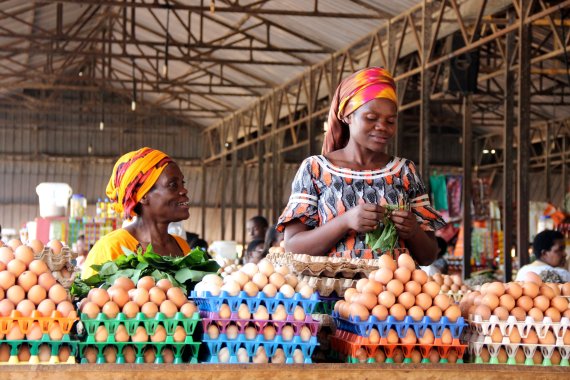Photo: Sarine Arslanian, Shutterstock
If African countries do not make haste to support agriculture rather than leaving it to the mercies of the free market, the continent will face much more hunger in future than it has known to date. So says agricultural economist Niek Koning in his book Food Security, Agricultural Policies and Economic Growth.
Koning, who used to teach at Wageningen University and is well-known for his criticism of neo-liberal market thinking, describes how agriculture opened a ‘geological savings account’ in 1850. The use of fossil fuels made transport, tractors and artificial fertilizer possible, boosting food production. Up until 1850, population growth was always followed by famine and population decline, but the ‘fossil revolution’ made it possible for the world population to grow to 7.5 billion. Only: the savings account is nearly empty, or should no longer be drawn on because of climate change.
This is why Africa is now threatened with famines like those of the pre-fossil fuel era, says Koning. With conflict and migration as a consequence. The population is set to quadruple between now and 2100, while agriculture on the continent remains poorly developed. This is because African governments do not support their own agriculture sectors. They import cheap rice from Asia and cheap chicken from Europe, and African farmers then receive lower prices. African countries which do want to support their farmers are thwarted by the World Bank, the IMF and the European Union.
Koning proposes an extensive programme of measures aimed at turning the tide. He wants to stabilize the price of food crops worldwide by creating buffers. An international organization should buy up food as soon as prices drop too far and then sell it when prices go too high. Trade quota and production limits should also be used to help prevent large stockpiles from building up. And African countries should introduce import duties and build good roads in rural areas.
Koning drew support this month at a symposium on his book in Wageningen. According to emeritus professor Rudy Rabbinge, liberal economic policy must stop, and fast. Faith in the free market is eroding fast among economists, agrees Erwin Bulte, professor of Development Economics at WUR. ‘For far too long we’ve been afraid of interfering with the global market. It is much too optimistic to think we can leave food security in Africa to the market.’
It is much too optimistic to think we can leave food security in Africa to the market
Bulte agrees that African countries should protect their own agriculture sectors. But he has his doubts about a price stabilization system. Food buffers attract smuggling and corruption, says the development economist. He argues for solutions at the micro level: when farmers more often keep their crops in storage instead of selling them straight after harvesting, that stabilizes prices too.
Economist Ruerd Ruben of Wageningen Economic Research has his doubts too. ‘Price stabilization for food via the government is an expensive policy. A better approach is to improve efficiency in the food chain, by investing in roads, for instance. Then local production can compete better with food imports.’

